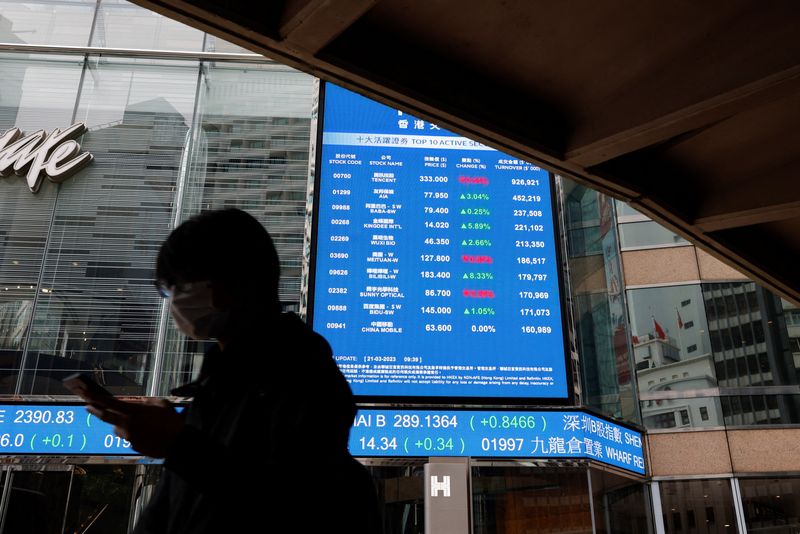By Jamie McGeever
(Reuters) - A look at the day ahead in Asian markets.
Asian markets open on Tuesday against an extremely challenging backdrop of slumping global equity and bond prices, a rising dollar, and the yen's slide to lows that many analysts reckon will prompt direct intervention from Japanese authorities.
U.S. and world stocks fell to two-month lows - the S&P 500 chalked up its biggest two-day decline in over a year - as the 10-year U.S. Treasury yield and dollar index made fresh 2024 highs.
That's a tightening of financial conditions that will only weigh on Asian markets. Goldman Sachs' aggregate emerging market financial conditions index hit a five-month high on Friday, and almost certainly rose further on Monday.
It is the backdrop against which China releases top-tier economic data including March industrial production, retail sales, fixed asset investment and house prices, which will all be wrapped up in first quarter GDP growth figures.
Chinese stocks rallied on Monday after the securities regulator on Friday issued draft rules to improve the market and protect investors' interests, but that momentum is unlikely to last.
Recent economic data have fallen short of expectations, most notably trade, which saw a sharp contraction in exports, and credit growth, which hit a record low on a broad basis.
China's property crisis remains front of mind too, after state-backed developer China Vanke said it was facing short-term liquidity pressure and operational difficulties. The firm's Hong Kong-listed shares hit a record low on Monday.
Tuesday's official figures are expected to show China's growth slowed to 4.6% year-on-year from 5.2% in the previous three months, maintaining pressure on policymakers to unveil more stimulus measures.
That would be the slowest rate of expansion since the first quarter of 2023.
China's growth will figure highly in discussions between U.S. Treasury Secretary Janet Yellen and Chinese officials on the sidelines of the International Monetary Fund and World Bank spring meetings in Washington this week.
China's central bank on Monday fixed the yuan at its weakest level against the dollar since March 25. The onshore yuan hit a five-month low close to 7.24 per dollar, just inside its daily trading band limit.
There are no such overt limits on Japan's yen, of course, and even if there were, the currency's relentless slide this year would probably have smashed them anyway.
Once again, FX traders will be on high alert for yen-buying intervention from Japanese authorities after the yen slumped to a new 34-year low through 154.00 per dollar on Monday. It is the worst-performing G10 and main Asian currency this year.
Tokyo hasn't acted yet, but if it does, the yen's reversal could be powerful - hedge funds are sitting on their largest net short yen position in 17 years.
Here are key developments that could provide more direction to markets on Tuesday:
- China GDP (Q1)

- China industrial production, retail sales, investment, house prices (March)
- Indonesia consumer confidence (March)
(By Jamie McGeever; editing by Josie Kao)